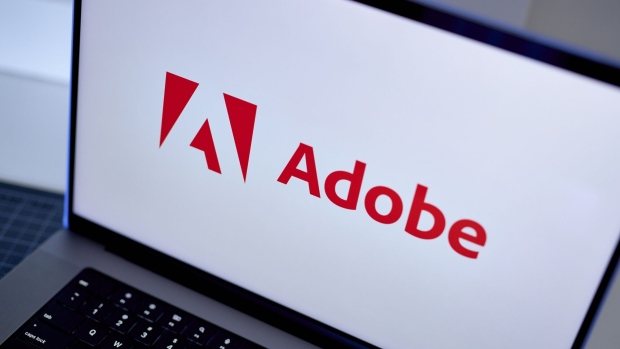Dec 18, 2023
Adobe Has $6 Billion for AI and Buybacks After Figma Deal Collapses
, Bloomberg News

(Bloomberg) -- Adobe Inc.’s failed merger with Figma Inc. leaves the software company with about $6 billion in cash that it will likely use to accelerate artificial intelligence development and buy back stock.
What’s less clear is how Adobe will address the competitive pressures that helped inspire the acquisition in the first place.
When the company struck the $20 billion deal for Figma last September, investors worried that Adobe’s core portfolio of creative software, including Photoshop and Illustrator, were running out of room to grow. Web-based startups such as Figma and Australia-based startup Canva Inc. were capturing the attention of younger users and rapidly gaining customers. The deal’s high price only further convinced Adobe shareholders that management was anxious about the competition.
Much of that gloom has dissipated in 2023 as Adobe invested rapidly into generative AI, building proprietary models and launching popular features. The stock has gained 77% this year as investors expect AI to expand Adobe’s user base, increase revenue per user and cement its dominance among creative design professionals.
For More: Adobe’s Focus Isn’t Figma Any More as Regulator Lawsuit Looms
At least for now. The long-term threat of Canva, Figma and new generative AI-based creative tools remain a concern for San Jose, California-based Adobe, Tyler Radke, an analyst at Citigroup Inc., wrote Monday after the companies announced they were terminating the proposed deal in the face of opposition from antitrust regulators in multiple countries. The decision was reached this past weekend after a difficult call with European regulators, a person familiar with the matter said.
Figma’s annual recurring revenue grew 40% this year to $600 million, the Information reported Monday. Canva, which focuses on posters and logos and is generally seen as a more-direct threat to Adobe, had annualized revenue of $1.7 billion in October.
Both startups represent a sliver of Adobe’s $12.4 billion of recurring revenue from creative software, but represent future danger.
Figma’s best-known product, used for designing apps and websites, was much more successful than Adobe’s equivalent, XD. Longer term, the startup may also become a threat to its bigger would-be acquirer in the main creative space like photo editing, wrote BMO Harris analyst Keith Bachman. San Francisco-based Figma also may be able to quicken the pace of its innovation using the $1 billion breakup fee that Adobe will have to pay.
To buttress its moat, Adobe is likely to invest even more heavily in AI features and its online platform aimed at new casual users, Express, multiple analysts said. The company also may make small acquisitions for intellectual property or staff.
Representatives of Adobe and Figma declined to comment beyond the statement announcing the end of the deal.
Dropping Figma frees up cash and management attention to focus on Adobe’s AI growth opportunity, wrote Mark Moerdler, an analyst at Sanford Bernstein. “Substantial improvements” in its web solutions reduce the need for Figma to improve Adobe’s products, he added.
Still, the excitement about AI doesn’t represent the same kind of immediate revenue-generator for Adobe as Figma’s product design app, wrote JPMorgan’s Mark R Murphy.
It’s unclear whether Adobe will resurrect XD, its product design application, which isn’t currently being sold or updated. The company suggested in its statement Monday that it could partner with Figma. Murphy added that silence on product design during Adobe’s user conference in October may suggest the company is quietly working on an expanded offering.
For now, investors are happy with the prospect of extra cash for share buybacks, which will boost the firm’s earnings per share. But those good feelings are predicated on the success of Adobe’s AI initiatives. When Adobe last week gave an outlook for new creative business in 2024 that fell just short of estimates, the stock suffered its worst single-day drop in seven months as investors worried that an AI revenue boost wasn’t coming fast enough.
©2023 Bloomberg L.P.





